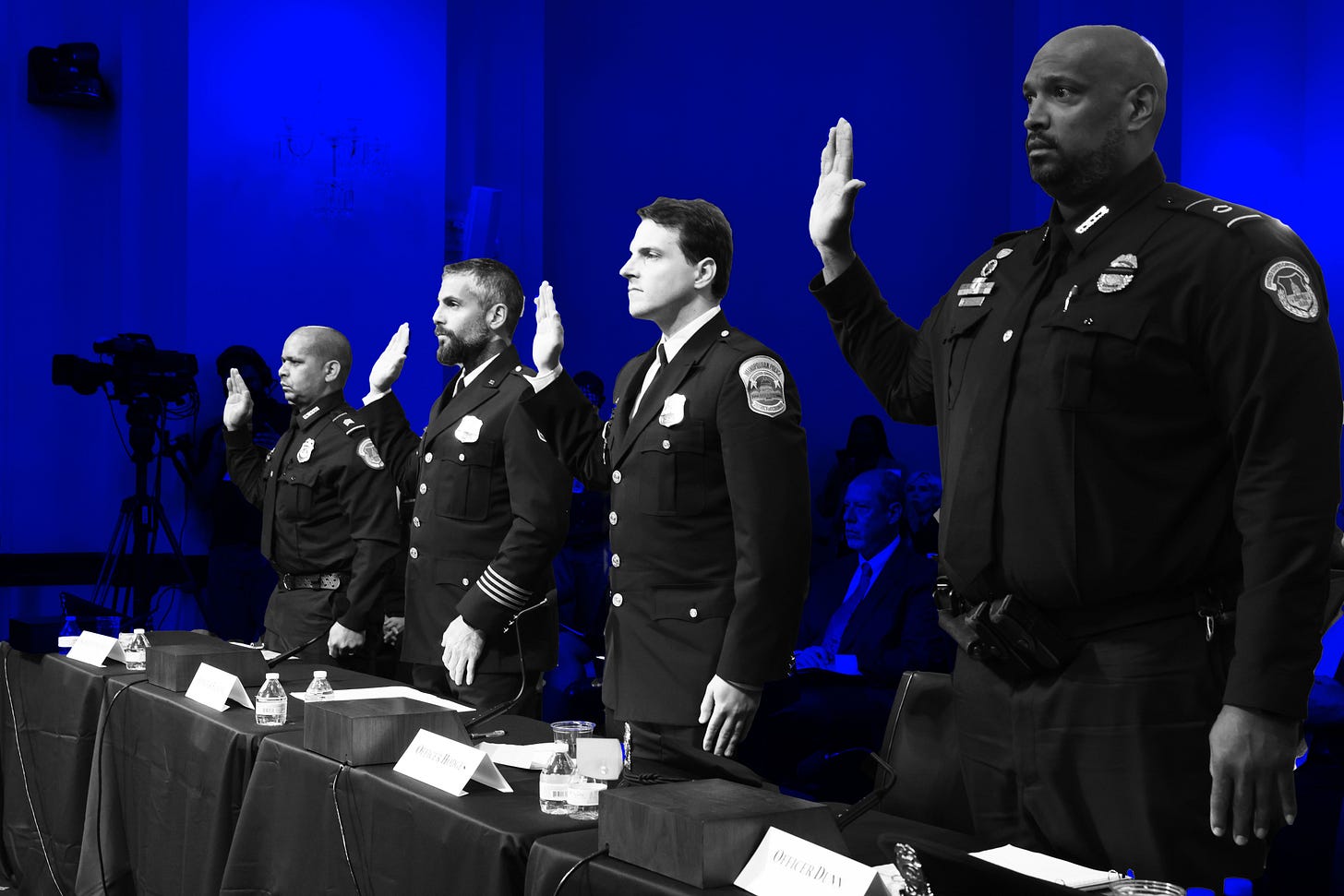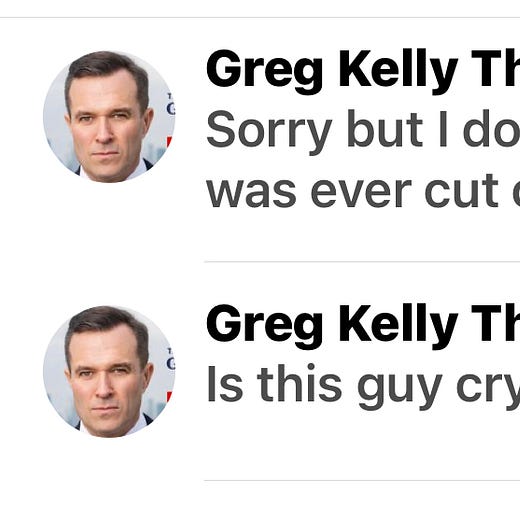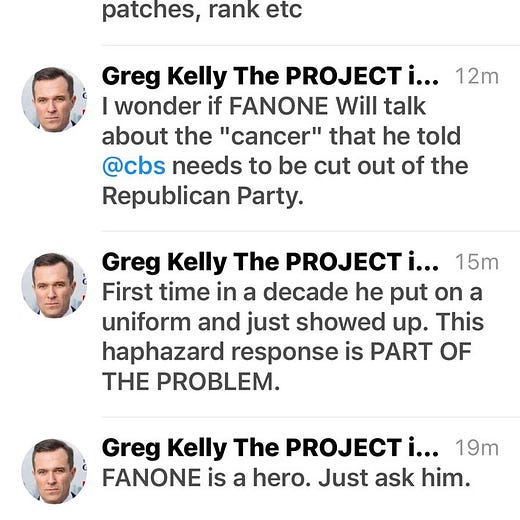
1. Back the Blue
If you’ve been reading this newsletter for a while, you know how cop-skeptical I am. Individually, police officers often act unprofessionally and collectively police officers often turn a blind eye to the misconduct of their colleagues. And generally speaking, it’s the cover up that reveals the rot.
Anyone can make a bad decision in a snap-second situation. Corruption is when an institution covers up its wrong decisions instead of bringing them to light.
But as I’ve been saying since January 8, by and large the performance of the Capitol police officers on the ground during the insurrection was exemplary. (The performance of the higher-ups is a different matter.) It was everything we want from law enforcement: They deescalated violent situations when they could. They placed themselves in harm’s way in order to protect the members of Congress. It is a miracle—a damn miracle—that only one of the insurrectionists was killed.
Because if the Capitol Police had acted like the Buffalo PD, then the death toll would have been unthinkably high.
Here is something I want you to consider when we talk about the ways in which both conservatism and the Republican party are trending toward actual, no-fooling authoritarianism:
Many Republicans and conservatives are quick to defend the police any time they act unprofessionally. Shoot a black kid? They had a reasonable suspicion he might be armed. Choke black guy to death? He was resisting arrest. Black Lives Matter? Blue Lives Matter, bitches.
But when it comes to the Capitol Police doing their jobs professionally, suddenly these same people are quite anti-cop:
The situational nature of their support for law enforcement is revealing. When these people talk about “backing the Blue” what they really mean is that they support violence against their enemies.
Never forget this.
Authoritarianism is real. The door to political violence has been opened in America for the first time in 50 years. It’s time to stand up.
Sign up to get The Bulwark in your inbox every day. Join Bulwark+ to get even more.
2. Olympics
I’m an absolute sucker for the Olympics.
For me, the essence of sports—the real juice—is stakes. Show me a stakes game where everyone on the field really cares about winning and I’ll sit down and watch. Doesn’t matter if it’s a 7th grade basketball league championship game or Olympic synchronized diving final.
When the athletes care, then we care.
This is why so much of the NBA and NFL product falls flat for me. Playoff football between high-quality teams is amazing. A late-season game between two 5-10 teams is a death march. If anything, the NBA is even worse because most regular season games are meaningless.
All of which is to say that the Simone Biles news today is crazy.
After a rough go in the prelims, Biles did one event in the team final this morning and then pulled out. Clearly, something wasn’t right with her and this is the sort of stakes moment that makes the Olympics so compelling: Because it’s an amped-up, super-contrast example of the human condition.
I don’t know exactly what happened to Biles, but if I had to guess it would be something like this: The entire weight of the world has been on her shoulders, for years, in full view of several billion people.
It’s one thing to be a dominant racer who is expected to perform well. Generally speaking, fast never takes a day off. But skill sports are different and require a different type of mental focus.
And being a “dominant” athlete is different than having billions of people—with a “b”—talking about how you’re the greatest of all time, how no one else is even close, how you’re leading a team in a historic level of dominance, etc. As I’ve watched the Biles-mania of the last month, I kept thinking that the assumptions baked into it were incredibly, almost criminally, unfair to her.
Biles is the greatest of all time. But she’s also 24 years old in a sport that’s built for teenagers. She’s doing this with an extra year of wear and tear on her body. And that extra year was also another 12 months that she had to wake up and be Simone Biles for the rest of the world, every day.
God love this kid. If she never competes again, she’s already the GOAT. She should be cherished, admired, and supported. And the rest of the women on the team who stepped up—especially Jordan Chiles—ought to be celebrated, too.
That’s the thing about stakes games. It’s not the outcome that matters. It’s what the games bring out in us.
3. Howard the Duck
I didn’t know what a box-office bomb was in 1986, but I knew that Howard the Duck was something extraordinary. THR has an oral history on one of the signature cinematic disasters of our time:
At the end of a lengthy bicoastal audition process, Zien learned Robin Williams had been cast as the voice of Howard. But that would not last long, as Zien reveals the late actor-comedian left the project within the first week out of frustration over syncing his voice to the duck’s animatronic bill. An actor to voice Howard had not been cast during production, so all of Howard’s lines were read on set by the puppeteers, and the bill moved to fit their bland delivery, rendering Williams’ wild improvisational style moot in postproduction.
“What I was told was by the third day, Robin said, ‘I can’t do this. It is insane. I can’t get the rhythm of this. I am being confined. I am being handcuffed in order to match the flapping duck’s bill.'” Zien reminisces. “So, on Memorial Day 1985, I got a call from my agent who said, ‘You have to get right to the airport! Robin Williams just quit and you’re now Howard the Duck. You need to get there tonight. There is a ticket waiting for you at the counter.’ I was incredibly excited.” . . .
“It wasn’t working on the level it needed to work on,” Thompson remarks. “I felt like I was dragging Howard the Duck up a hill by myself with my teeth the whole time. All the jokes were falling flat. Comedy is a souffle. We had amazing puppeteers, but they were the ones doing the jokes. I was like, ‘It would be great if you could have an actor doing the lines to keep the ball in the air.’ The technical side of making the movie was so difficult and fraught. I kept saying to them, ‘The duck doesn’t work.'”
Zien confesses he was also concerned after he saw the first 12 minutes of footage in his initial recording session at Industrial Light & Magic.
“I thought, ‘Uh oh. This looks a little weird,'” admits Zien. “I called my wife and said, ‘I don’t know. The technology seems a bit behind the times.’ But — and this is really important — by my fourth day, I thought this was the greatest film ever made.” . . .
Executive producer Lucas was positive he had another mega-franchise on his hands like Star Wars and Indiana Jones, with Zien revealing that he signed on for a total of three films. “I was supposed to be Howard the Duck as a fill-in host on Entertainment Tonight,” discloses the actor. “I signed a contract to be the voice of AT&T. And I had ancillary rights for talking Howard the Duck dolls. It was overwhelming.”
Lucas threw a massive postproduction bash at his sprawling Northern California estate, with festivities that included a full circus, Zien says. And for a moment, the actor didn’t have a care in the world as he marveled at the grand spectacle, believing he was on the cusp of great wealth and film stardom. That would quickly change.







